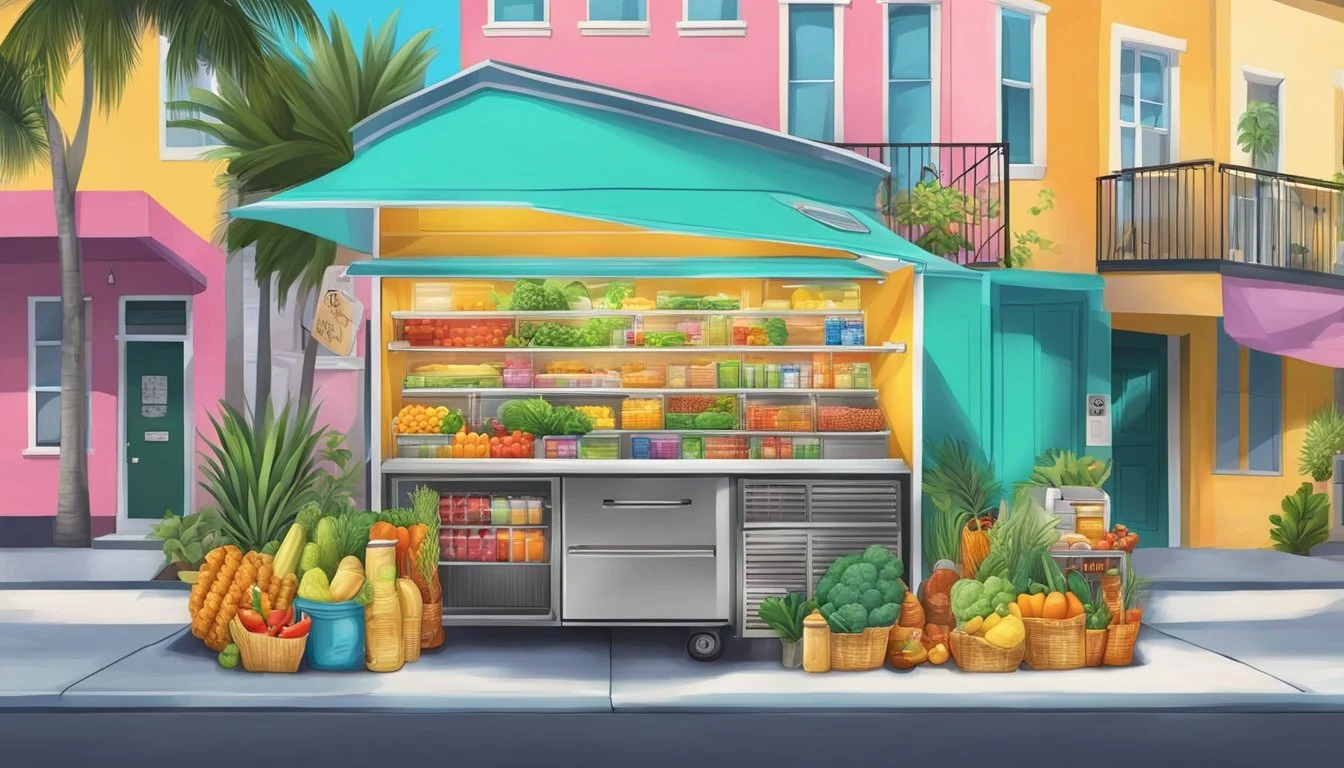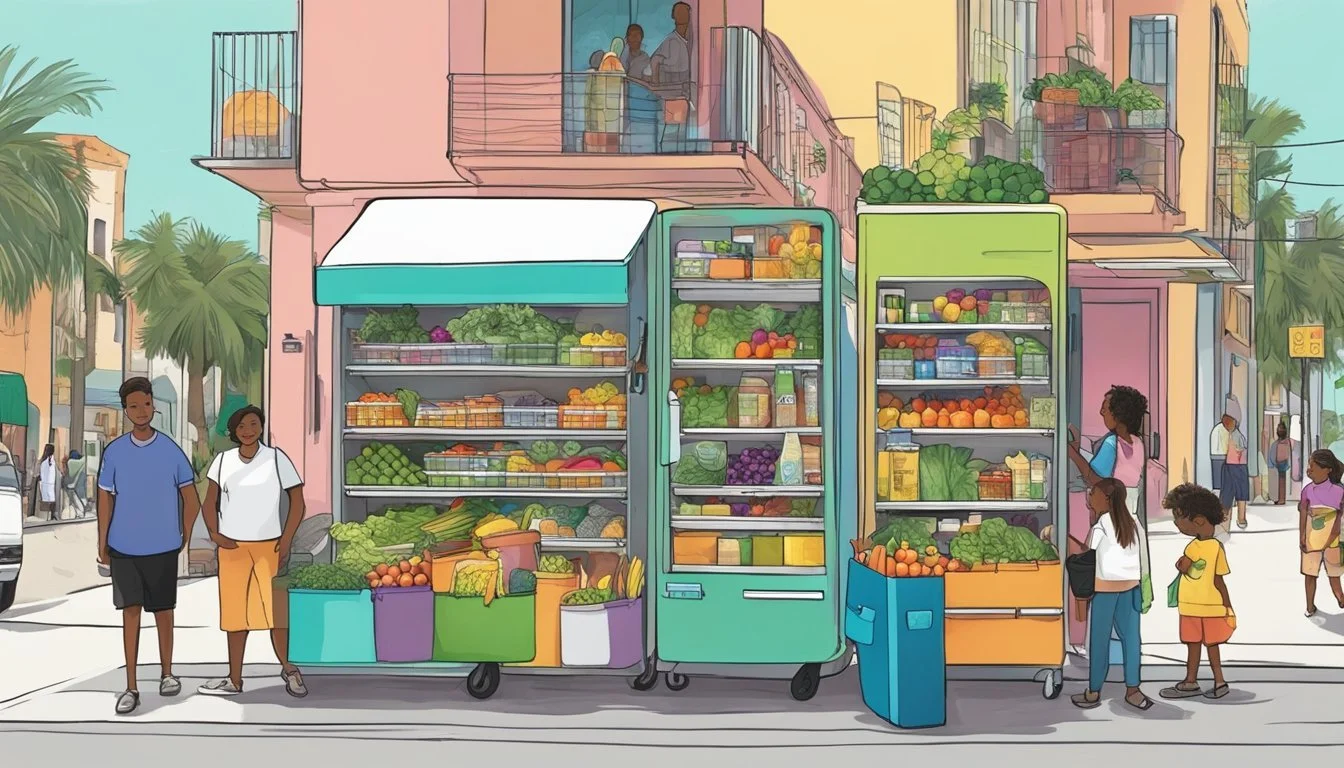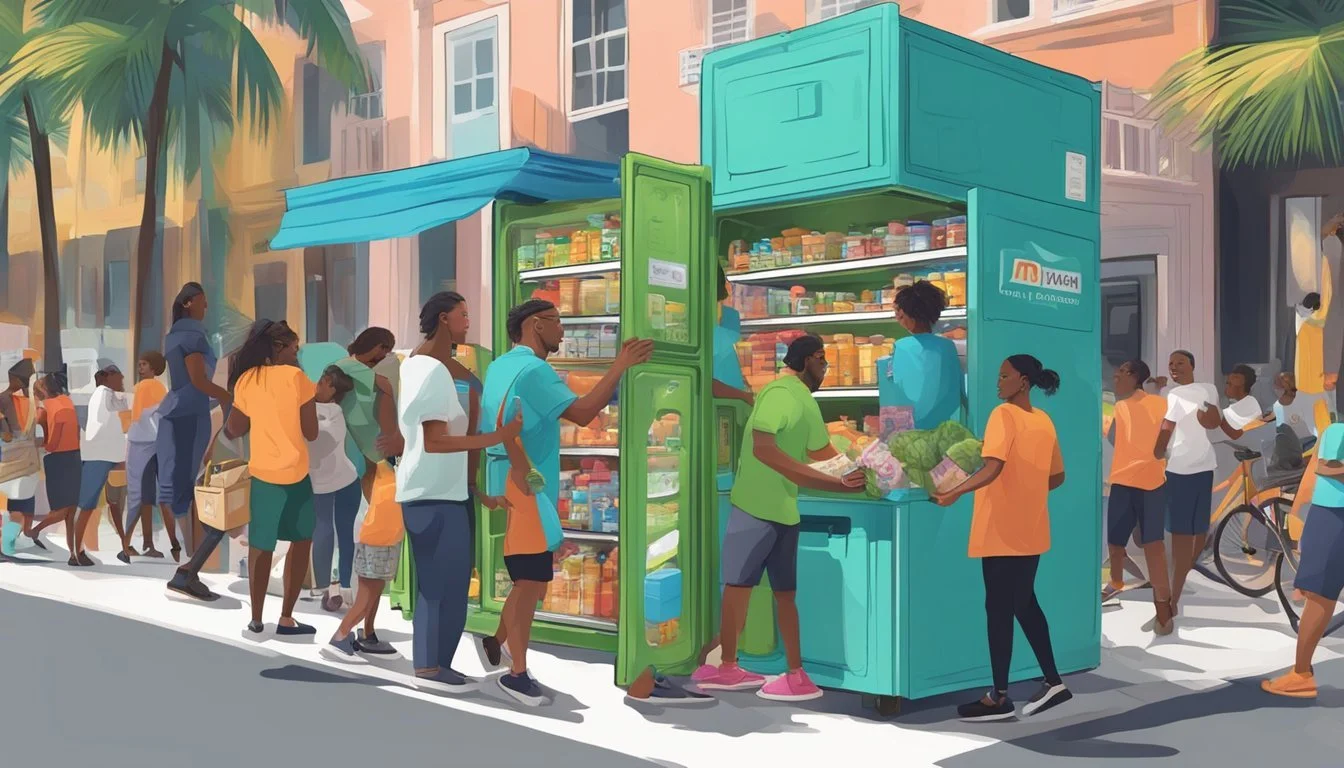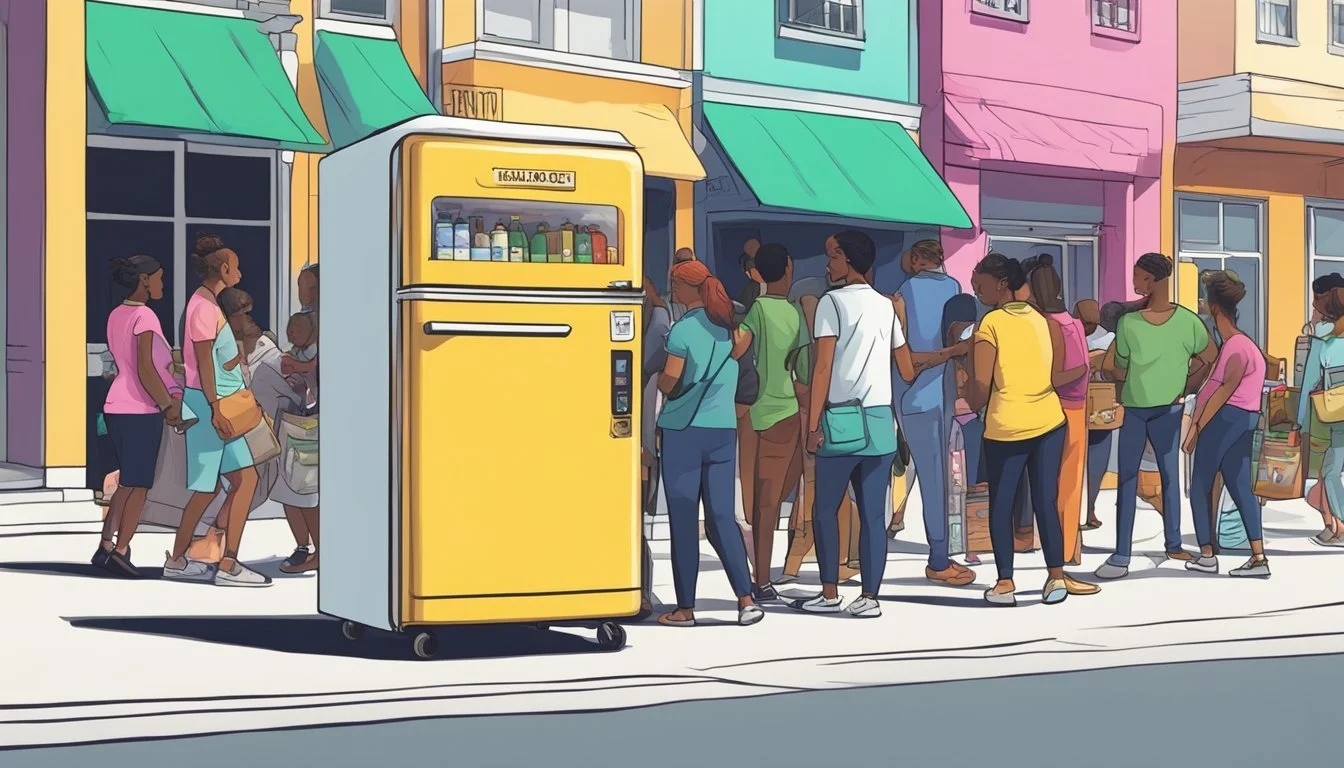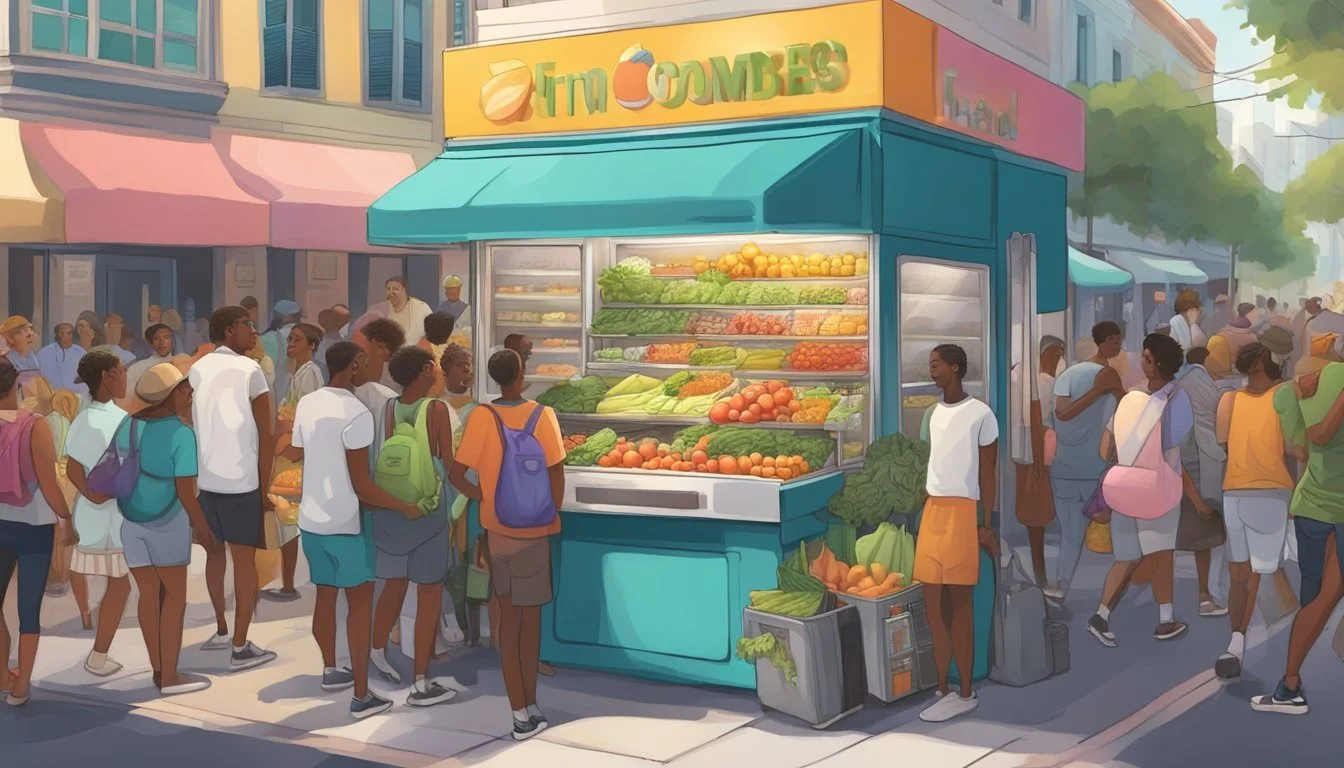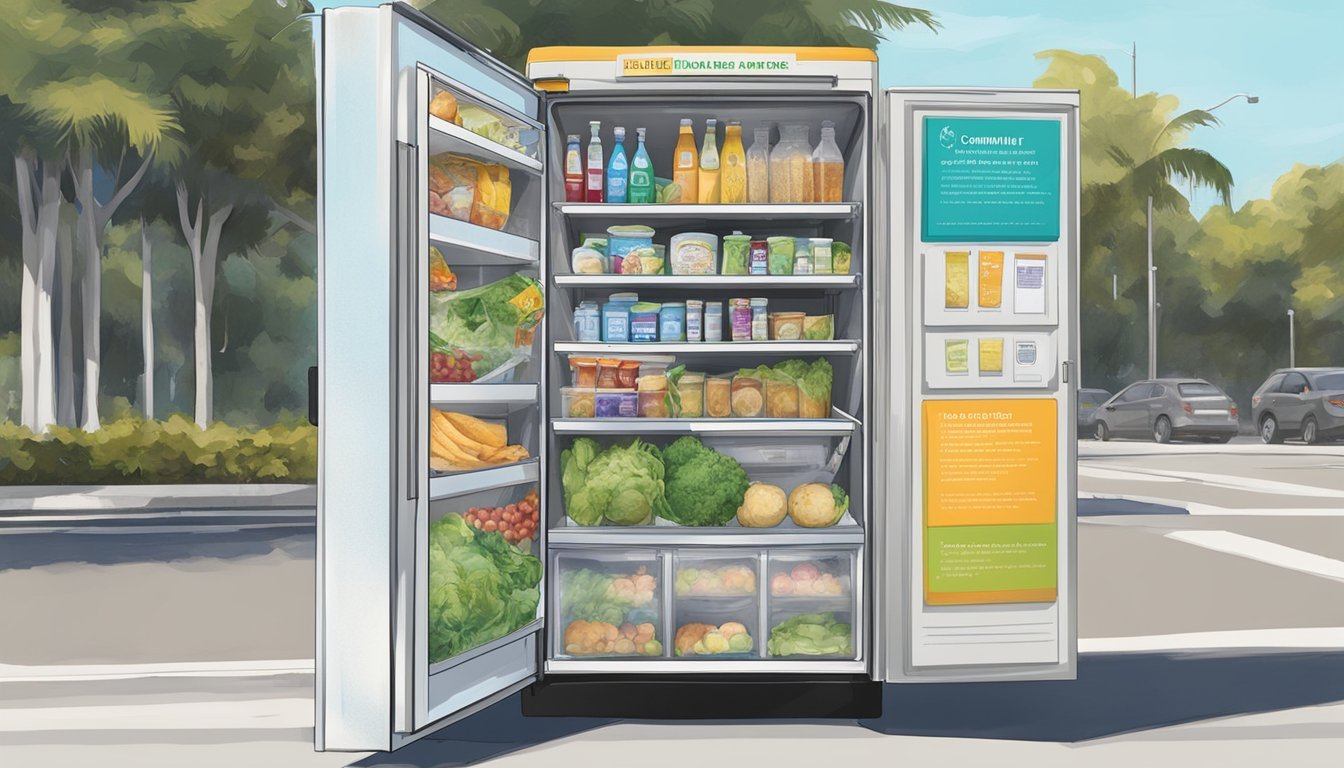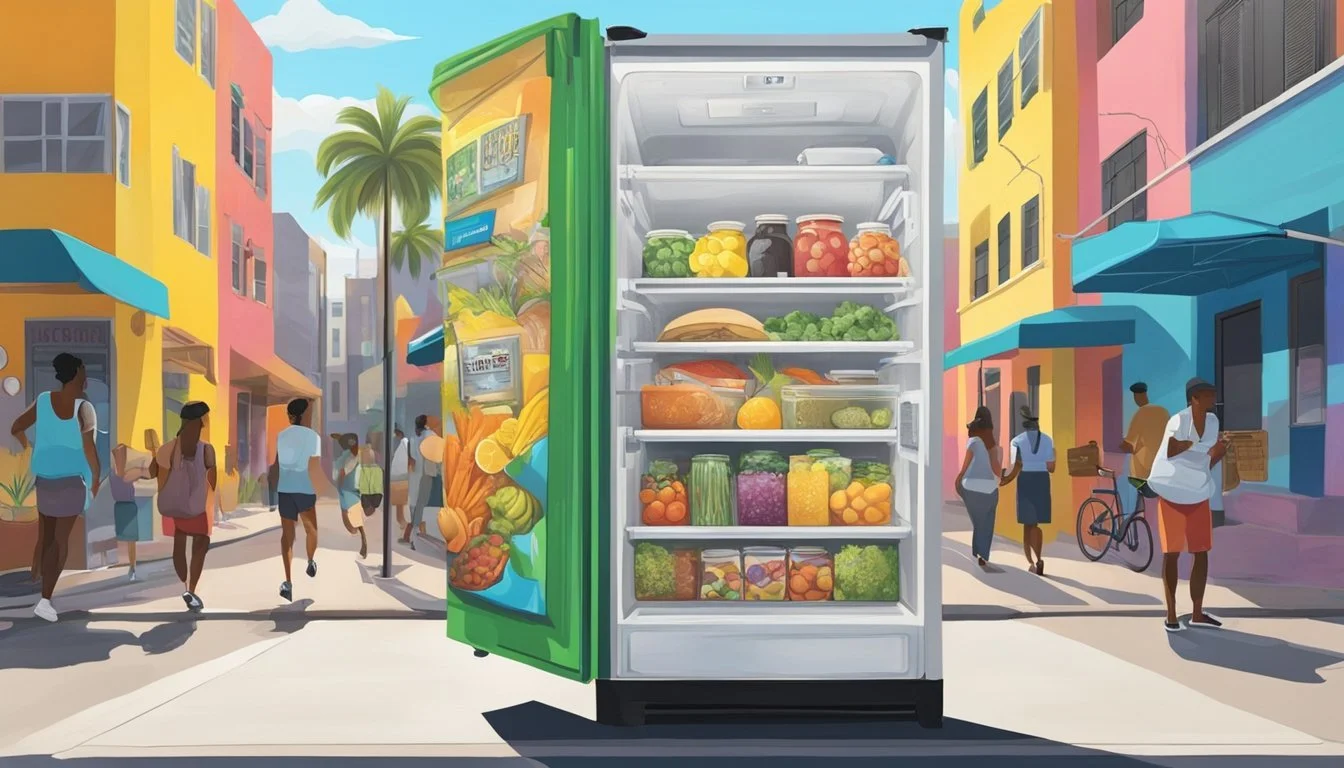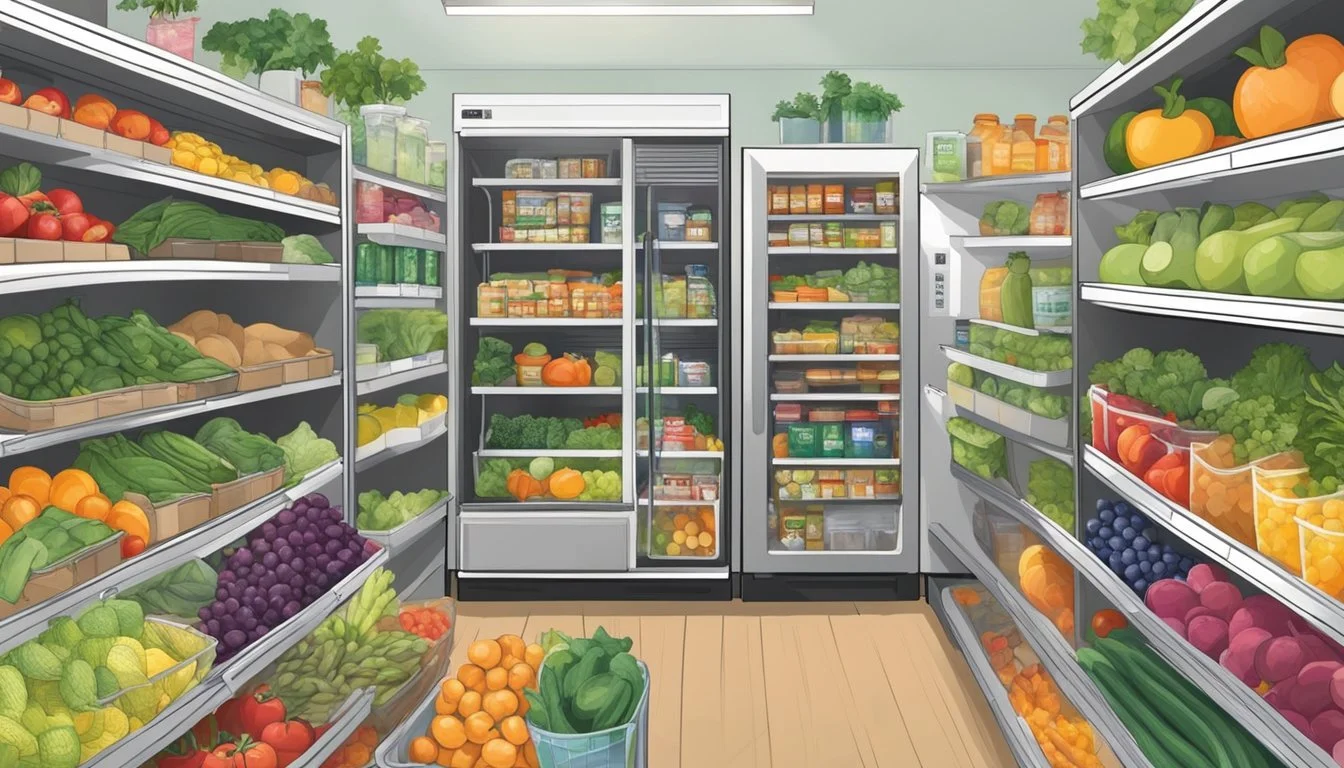Miami, FL Community Fridge
Nourishing Neighborhoods One Meal at a Time
Community fridges have become a vital resource in Miami-Dade County, offering a simple yet powerful solution to address food insecurity. These refrigerators, placed strategically throughout the area, operate on a mutual aid basis where the community is encouraged to 'take what you need, leave what you can'. The Buddy System MIA, a grassroots organization, has been instrumental in establishing these fridges, providing free access to fresh food for those in need.
The impact of the Miami Community Fridge program has been significant, reaching numerous under-represented communities. By positioning these fridges within food deserts—areas where access to affordable, healthy food is limited—they create points of access to nutrition that might otherwise be unavailable. This initiative has supported thousands, reflecting a growing movement towards community-run solutions to systemic issues.
With the opening of its 10th fridge, Buddy System MIA continues to draw attention to the challenge of food scarcity, sparking discussions and increasing awareness. This network of community fridges not only offers sustenance but also serves as a symbol of solidarity and local empowerment, showcasing how communities can come together to support one another in practical and impactful ways.
Understanding Food Insecurity in Miami
Food insecurity remains a critical issue in Miami, where it is defined by the limited or uncertain access to nutritionally adequate foods. A substantial number of Miami-Dade County residents face the daily challenge of hunger, largely due to economic constraints that restrict their ability to purchase enough food.
Prevalence: Latest figures from Feeding America indicate that more than 278,000 individuals within Miami-Dade County deal with food insecurity. This condition often leads to a reliance on food banks, pantries, or community-driven efforts to obtain necessary sustenance.
Food Deserts: Food insecurity is exacerbated by the presence of food deserts—urban areas where residents find it difficult to buy affordable or good-quality fresh food. These deserts contribute significantly to the problem as they limit access to essential food resources, particularly for households without reliable transportation.
Community Response:
Community Fridges: As one response to the issue of food insecurity, several initiatives, such as the establishment of community fridges, have taken root. These are found across Miami and operated on a simple principle: "take what you need, leave what you can."
Buddy System MIA: For instance, the Buddy System MIA project has installed ten Community Fridges throughout the county, transforming access in food deserts.
The primary objective in addressing food insecurity involves ensuring that all food insecure communities have consistent access to sufficient, safe, and nutritious food. Miami's community efforts to support vulnerable populations demonstrate the potential for grassroots solutions to social challenges.
The Concept of Community Fridges
Community fridges in Miami offer a novel approach to addressing food insecurity. These refrigerators provide a place where individuals can access free food and donate what they can.
Benefits of Community Fridges
Community fridges present several advantages for people facing food insecurity. They operate on a simple principle: Take what you need, leave what you can. This model provides:
Accessible Food Assistance: They are typically located in areas known as food deserts to ensure those in need can find fresh food conveniently.
Nutritional Variety: The fridges are stocked with both perishable and non-perishable items, allowing for a balanced offering that ranges from fresh produce to canned goods.
Community Empowerment: These initiatives foster community spirit and mutual aid, as residents both give and receive assistance.
Challenges and Solutions
While community fridges are beneficial, they come with challenges:
Food Safety: Ensuring perishable goods remain safe to consume is a priority. Solutions include regular monitoring and clear guidelines on what can be donated.
Sustainability: Maintaining a consistent supply of food requires community engagement and donations. Organized food drives and local partnerships can help sustain inventory levels.
Vandalism and Theft: These issues can compromise the integrity of the effort, but community involvement and vigilance, as well as potentially implementing security measures, may mitigate such risks.
Community Fridges in Miami-Dade County
Community fridges have become a key element in addressing food insecurity across Miami-Dade County, offering free, healthy food to those in need with a simple guideline of sharing and caring within the community.
Locations and Impact
Community fridges are strategically placed in several neighborhoods including Little Haiti, Coconut Grove, Richmond Heights, Overtown, Hialeah, and Homestead. Each location was chosen with the intention of mitigating food scarcity in areas that are considered food deserts.
Little Haiti and Overtown: These fridges cater to culturally rich neighborhoods, ensuring residents have access to fresh food without traveling long distances.
Coconut Grove and Richmond Heights: Placed in historically significant areas, the fridges also serve as symbols of community support and resilience.
Hialeah: Supporting one of the largest Latino communities in Miami, providing a blend of culturally relevant and nutritious food options.
Homestead: A pivotal location due to the distance from central Miami, this fridge ensures rural residents aren't overlooked.
The impact of these fridges is evidenced by the thousands of Miami residents they support, particularly within under-represented communities.
Collaborations and Partnerships
The success of the community fridge initiative in Miami relies heavily on collaboration and partnerships with various organizations and local activists.
Buddy System MIA: This grassroots organization has been fundamental in establishing and maintaining the community fridges, playing a central role in the overall operation.
Local Businesses and Farms: Contributions from these entities ensure a sustainable supply of fresh food.
Miami Community Fridge: Engaged in spreading awareness and getting more citizens involved.
These efforts ensure that the Miami community fridges remain stocked, accessible, and beneficial to the residents of Miami-Dade County.
Volunteer and Donation Opportunities
In Miami, numerous initiatives allow individuals to contribute to the wellbeing of their community through volunteering and donations. These opportunities underpin the success of the Community Fridge projects across the city.
How to Volunteer
Individuals interested in volunteering can engage with local organizations managing community fridges. Volunteers typically assist with stocking and cleaning fridges, organizing food drives, and coordinating community outreach efforts. Those looking to offer their time and energy can:
Contact the overseeing nonprofit to express interest in volunteering.
Participate in orientation or training sessions, if required.
Donation Guidelines
To donate, community members can bring fresh produce, non-perishable items, and sealed foodstuffs to the designated community fridge locations. Donors should ensure:
Freshness: Items are within their expiration date.
Safety: Food is unopened and untampered with.
Respect: Consider the needs and cultures of the community.
Acceptable Donations:
Fresh fruits and vegetables
Sealed packaged goods
Bread and pastries
Fundraising and Support
Financial contributions play a critical role in sustaining the longevity of community fridge projects. Monetary donations cover the cost of fridge maintenance, purchase of food supplies, and expansion efforts. Supporters can:
Contribute through official funding channels like GoFundMe campaigns.
Organize their own fundraising events, with the guidance of the community fridge's parent organization.
Support Programs and Initiatives
Miami's efforts to combat food insecurity have led to innovative community support programs. These initiatives focus on providing free, healthy food to residents, fostering a take-what-you-need, leave-what-you-can philosophy.
Buddy System MIA
Buddy System MIA has installed ten Community Fridges throughout Miami-Dade County. These fridges are strategically placed in areas known as food deserts, with the clear objective to aid under-represented communities. Local residents are empowered by this initiative through the open access to nutritious food, embodying a reciprocal ethos.
Overtown Optimist Club
The Overtown Optimist Club engages in uplifting local youth and families through various programs. Although primarily focused on educational and athletic programs, they support food distribution efforts in their local community. By collaborating with other organizations, they extend nutritional support to those in need.
Health in the Hood
Health in the Hood advocates for health equity by installing community gardens and providing access to fresh produce. They partner with neighborhood locals to educate and encourage healthy eating practices. Their involvement transcends mere food provision; they also equip residents with knowledge on cultivating their own nutritional food sources.
Food Distribution Networks
In Miami, FL, the community is actively supported through various food distribution networks which include local food banks and avenues for access to meals and groceries. These networks play a crucial role in ensuring that residents in need receive the sustenance they require.
Local Food Banks
Local food banks in Miami serve as fundamental components of the food distribution network. They are instrumental in collecting, storing, and distributing food to individuals and families experiencing food insecurity. Organizations such as Farm Share partner with local Florida farms to rescue fresh produce that would otherwise go to waste and distribute it through food banks. These banks work with a network of partner agencies, including soup kitchens and shelters, to ensure a wider reach.
Key Entities:
Farm Share
Food Banks
Distribution Partners
Meals and Groceries Access
Access to meals and groceries is provided through various programs, often in collaboration with food banks and local charities. Good Samaritan Meals offers prepared meals to those in need, targeting homeless individuals and families unable to cook for themselves. Community fridges, like those instituted by the Buddy System Miami project, are placed throughout the city to offer free, healthy food directly to the public, serving as an open-access point for groceries.
Key Programs:
Good Samaritan Meals
Community Fridges
By leveraging these networks, Miami continues to address issues of food scarcity and aims to provide all residents with the dignity and security that comes from reliable food access.
Addressing Homelessness and Food Waste
In Miami, initiatives like the Community Fridge aim to provide shelter support and reduce food waste while ensuring access to healthy food for the homeless and homebound communities.
Shelter and Homebound Support
Community fridges in Miami serve as a vital resource for individuals facing homelessness and those confined to their homes due to health or mobility issues. They offer immediate access to free food that can alleviate the day-to-day stress of food insecurity for these vulnerable populations.
Reducing Food Waste
These fridges not only support the homeless but also play a significant role in combatting food waste. Unsold or surplus produce from local businesses, restaurants, and households finds a second life as they stock the community fridges, preventing edible food from contributing to landfill waste.
Healthy Food for Homeless
A cornerstone of the community fridge initiative is the emphasis on healthy, nutritious offerings. This program ensures that the homeless population is not only fed but also has access to food that supports their health and well-being, an often overlooked aspect of food aid.
Community Engagement and Awareness
Community fridges in Miami, FL serve as hubs for local advocacy and education, engaging both residents and artists in the fight against food insecurity. They illustrate a collective investment in community welfare and awareness of social issues.
Local Artist Contributions
Miami artists contribute significantly to the community fridge movement by enhancing their visibility and appeal. Local artists often decorate the fridges, transforming these points of aid into vibrant works of art. This involvement not only draws attention to the cause but also fosters a sense of ownership and pride within the community. Collaborations between artists and community leaders help maintain the fridges as symbols of togetherness and empathy.
Educational Campaigns
Educational campaigns are pivotal in spreading awareness about food insecurity and the role of community fridges. The involvement of organizations like Feeding America in disseminating facts and figures about local need empowers the community to take action. Informative programs and materials provide critical data:
More than 278,000 Miami-Dade residents face food insecurity.
Initiatives during Hunger Action Month highlight ways to combat hunger locally.
These campaigns aim to educate residents on the importance of the "take what you need, leave what you can" philosophy, ensuring the community fridges are continually stocked for those in need.
Legal and Health Considerations
In establishing a community fridge, one must adhere to both legal frameworks and health standards to ensure the safety and legality of food assistance programs. Miami community fridges operate within these constraints, balancing the need to provide free, healthy food with the necessity of meeting regulatory compliance.
Food Safety Regulations
Miami's Community Fridges fall under local food safety regulations to ensure that they provide safe and healthy food for the public. They must:
Regularly monitor temperatures to keep perishable items within safe consumption ranges.
Discard expired or spoiled food items promptly to prevent health risks.
Ensure that food donations meet the guidelines for acceptable items, usually excluding homemade, unpasteurized, or open container foods.
It is important for initiatives, such as Health in the Hood, to continuously train volunteers and organizers in proper food handling and safety protocols to maintain these standards.
Nonprofit Organization Compliance
Nonprofit entities managing community fridges, like the Buddy System MIA, must comply with various legal obligations:
501(c)(3) regulations: They must operate as a tax-exempt nonprofit under the IRS code 501(c)(3) if they want to allow their donors to write off contributions.
State laws: They must follow the specific nonprofit laws in the state of Florida, which govern fundraising, operations, and financial reporting.
By adhering to these legal requirements, organizations not only sustain their operations but also foster trust within the community, ensuring the longevity of the food assistance programs they provide.
Future of Community Fridges in Miami
The trajectory of community fridge initiatives in Miami is marked by continued growth and a focus on sustainable practices. As mutual aid efforts flourish, the city's landscape of support and food sharing evolves.
Expansion Plans
Miami's community fridges have become a symbol of mutual aid and community support, collectively combating food insecurity. The expansion plans indicate an intent to increase the number of fridges across Miami-Dade County. These plans are designed to serve more people by placing the fridges strategically in areas with limited access to affordable, healthy food.
Target Areas for New Fridges:
Under-served neighborhoods
Districts identified as food deserts
Collaboration with Local Organizations:
Partnerships to fund and maintain fridges
Involvement of community leaders for local engagement
Sustainability Practices
Ensuring the sustainability of Miami's community fridge network is critical for its longevity. Organizers are implementing several practices to maintain the operation of the fridges efficiently and ecologically.
Eco-Friendly Refrigeration:
Use of energy-efficient appliances
Regular maintenance to reduce energy consumption
Waste Reduction Efforts:
Monitoring to prevent food waste
Encouraging community education on proper usage
By adhering to these expansion and sustainability strategies, community fridges in Miami aim to extend their reach and serve as enduring resources for residents. The community fridge model continues to showcase how cities can foster mutual aid that not only addresses immediate needs but also builds a more connected and resilient society.
Contributing Factors to Success
The Miami Community Fridge initiative thrives due to robust community involvement and a keen awareness of aesthetic appeal, both of which are pivotal to the success of this humanitarian project.
Community Involvement
The involvement of the community has been instrumental in the success of Miami's Community Fridges. Organizations like Roots Collective have been foundational in fostering a network of support. Individuals from all walks of life understand the initiative's motto: "Take what you need, leave what you can." Such participatory action has established a self-sustaining ecosystem of food sharing. Local volunteers regularly maintain the fridges, ensuring they are clean and stocked with free, healthy food for those in need.
Key aspects of community involvement include:
Local maintenance: Residents are taking ownership by taking care of the fridges, which promotes their continuous use and success.
Donations: The community actively donates food, demonstrating shared responsibility and compassion.
Aesthetic Appeal
The aesthetic appeal of the community fridges is not only to attract attention but also to destigmatize the use of free food resources. Local aestheticians and artists contribute by designing engaging and culturally relevant exteriors, making the fridges not only functional but also a point of community pride.
Notable points on aesthetic appeal:
Design: The fridges feature striking designs that integrate well within the community's landscape.
Visibility: Artistic contributions increase the fridges' visibility, encouraging more frequent use and community engagement.
These factors combine to make the Miami Community Fridge initiative a sustainable model of mutual aid and a testament to what a community can accomplish together.

